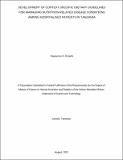Development of context-specific dietary guidelines for managing nutrition-related disease conditions among hospitalised patients in Tanzania
Abstract
Barriers to adequate food intake among hospitalised patients with nutrition-related disease
conditions such as diabetes, cancer, kidney disease, and hypertension, are multifactorial and
complex. Due to this, these disease conditions require multi-level interventions, including a
change in the attitude and improved awareness towards food among healthcare staff and
hospitalised patients. The priority interventions need to be feasible in practice, particularly in
terms of the availability, affordability, accessibility, and time. This can be successful when
specific food-based dietary guidelines for each disease condition are in place. Unfortunately,
specific dietary guidelines for managing nutrition-related chronic disease conditions among the
hospitalised patients are currently not well established in Tanzania. This significantly contributes
to delayed recovery of patients and increased economic burden to families and communities due
to increased medical costs resulting from prolonged length of hospital stays, readmission, and
mortality. Our study aimed to develop context-specific food-based dietary guidelines which
favour healthy eating in the light of gut microbiome to guide health care professionals and
nutritionists to make rational decisions in planning diets for these patients. A cross-sectional
study was conducted to collect data on dietary intake, dietary patterns, food price and availability
to inform the formulation of specific food-based dietary guidelines for hospitalised patients in
Tanzania. Moreover, a 7-day weighed food record (WFR) was used to assess dietary intake data
among 400 hospitalised patients with nutrition-related chronic diseases. Likewise, data on prices
of commonly consumed foods were obtained from hospitals’ requisition books, nearby markets
and shops. Furthermore, a linear goal programming was used to optimize dietary intake patterns
for hospitalised patients with nutrition-related disease conditions by developing food-based
dietary guidelines based on the study’s context. The analysis showed that whole grains mainly
dominated the observed hospital dietary patterns. However, diet optimization using linear
programming (LP) provided adequate dietary patterns with nutrient-dense foods for each food
group. The LP findings informed the process of formulating context-specific optimal dietary
guidelines that use culturally acceptable food ingredients, and which favour healthy eating in the
light of gut microbiota for managing nutrition-related chronic diseases for hospitalised patients.

